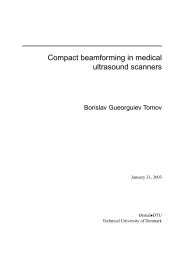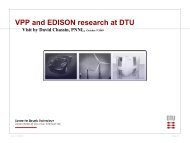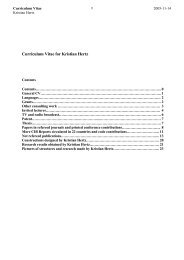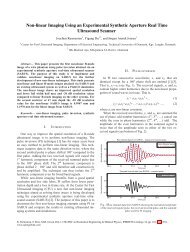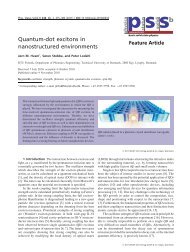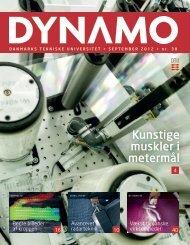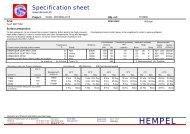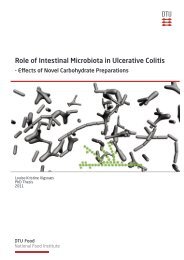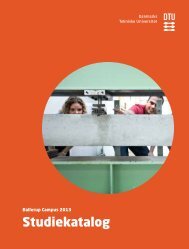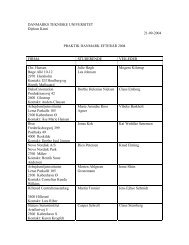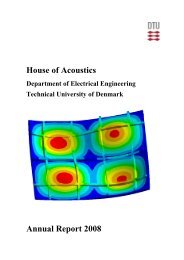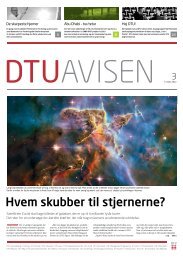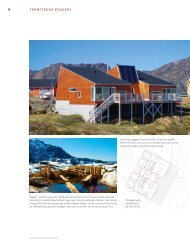MSc programs - DTU
MSc programs - DTU
MSc programs - DTU
You also want an ePaper? Increase the reach of your titles
YUMPU automatically turns print PDFs into web optimized ePapers that Google loves.
26<br />
Mathematics and Informatics<br />
<strong>MSc</strong> in Mathematical Modeling and Computation<br />
Semesters: 4<br />
Study credits: 120 ECTS<br />
Start: September 2007<br />
Seats: 60<br />
Application date: March 15 or June 1, 2007<br />
Today mathematics is more relevant, more needed than ever before, and is part of nearly every<br />
aspect of our everyday lives. Mathematics is in cellular phones, train schedules and search engines<br />
– just to name a few. And its future looks even brighter. There is an ever increasing demand for<br />
mathematical models and methods in industrial applications, information technology, financial<br />
institutions, agriculture, government, health care and many other areas driven by technological<br />
achievements. The easy and fast access to data creates many new opportunities for doing things<br />
better, more efficiently, and with less reliance on natural resources, as a result of our understanding<br />
of complex underlying patterns and structures of the systems. Examples include airline scheduling,<br />
medical imaging, DNA sequencing, wind power, and drug development. Embedded systems are<br />
now so small and powerful that very advanced calculations supporting intelligent control can be<br />
build into virtually any device, such as hearing aids, cellular phones, cars, household appliances, and<br />
medical equipment.<br />
This <strong>MSc</strong> program covers a wide range of topics in mathematics and its applications. The goal is to<br />
provide the graduates with a solid foundation in applied mathematics and mathematical modeling<br />
for industrial research and development, combined with skills in using modern computing facilities<br />
for handling large amounts of data. The program is a continuation of a highly successful and popular<br />
program, and the graduates now work in virtually all sectors of the society. The students who go<br />
through the uniquely designed cooperative thesis projects with industry often receive employment<br />
offers from the company or institution that is involved with the project. Moreover many students<br />
continue their training in PhD <strong>programs</strong>, and are offered research and development jobs. Industrial<br />
as well as governmental grants are also available.<br />
Study lines: Computational Data Analysis<br />
OR for Decision Making<br />
Mathematics and Scientific Computing<br />
Secure and Reliable Computing<br />
Career opportunities: Working with mathematical modeling often is to usemathematics in some<br />
completely different area – it could be health care or environmental engineering.<br />
The work requires communication skills, creativity, an open mind<br />
and a broad interest in the world around us and in working together<br />
with others. Of the 150 graduates from the last two years, six has started<br />
their own company, and more than 20 are PhD students. Others are working<br />
in industries in Europe, in the US and in Australia.<br />
Prerequisites: BSc degree in a related field, such as (applied) mathematics or engineering.<br />
BSc degrees in other areas- e.g. environmental sciences or physics<br />
– are also applicable. Basic university/college courses in Mathematical<br />
Analysis and Algebra, plus one or more areas of applie mathematics,<br />
broadly interpreted. Basic courses in Programming and, normally, in Phys-<br />
ics and Chemistry.<br />
Program coordinator: Professor Helle Rootzén (hero@imm.dtu.dk)<br />
Department: Informatics and Mathematical Modelling (www.imm.dtu.dk) and<br />
Department of Mathematics (www.mat.dtu.dk)<br />
Read more: www.imm.dtu.dk<br />
<strong>MSc</strong> in Computer Science and Engineering<br />
Semesters: 4<br />
Study credits: 120 ECTS<br />
Start: September 2007<br />
Seats: 60<br />
Application date: March 15 or June 1, 2007<br />
Computer Science and Engineering considers the design and use of computing components, software<br />
or hardware, to solve technical problems in an efficient and competitive way. The focus is on<br />
understanding and making the right choices of abstractions which makes it possible to implement<br />
IT solutions from existing and future components.<br />
As a professional designer you will model, analyze, design, implement, and validate complex IT systems,<br />
based on theoretically and technologically well-founded methods, tools and techniques. The<br />
Computer Science and Engineering Program will educate you to become a highly qualified engineer<br />
capable of developing complex IT systems consisting of both hardware and software, using these<br />
methods, tools and techniques.<br />
<strong>DTU</strong> has a strong and growing IT environment with competences in areas of great importance for<br />
the value growth and productivity of industry, academia and society. This covers areas such as safe<br />
and secure systems, system integration, distributed and embedded systems, networks, software<br />
engineering, algorithms, system-on-chip and digital systems. As a student in Computer Science and<br />
Engineering you will take part in this active IT environment.<br />
Study lines: Safe and Secure IT Systems<br />
System-on-Chip Design<br />
Career opportunities: Candidates in Computer Science and Engineering are able to use, develop<br />
and produce IT-systems at a high technical level. This makes them very<br />
attractive for both Danish and international companies and institutions.<br />
Candidates are typically employed in a very broad range of companies<br />
within the area of IT, electronics and telecommunications.<br />
Prerequisites: Technical BSc degrees in computer science, electronics or telecommunication.<br />
Skills within software programming and basic algorithms, and at<br />
least one of the following subjects: modeling, concurrency, networks, and<br />
digital systems.<br />
Program coordinator: Professor Jan Madsen (jan@imm.dtu.dk)<br />
Department: Department of Informatics and Mathematical Modeling<br />
(www.imm.dtu.dk)<br />
Read more: www.imm.dtu.dk/cse



